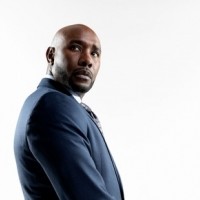Q&A Interview with LEGENDS' Stars Sean Bean, Ali Larter & Morris Chestnut + EP David Wilcox
Maj Canton - August 13, 2014

A few weeks ago, TV Tango attended the Television Critics Association 2014 Summer Press Tour, where Turner Broadcasting hosted a LEGENDS panel with stars Sean Bean, Ali Larter & Morris Chestnut and executive producer David Wilcox. During the session, Sean discussed #DontKillSeanBean and revealed which character death is his favorite, Ali gave the scoop about her character going undercover and talked about gun training, and the entire panel dished details about Sean's undercover personas. For complete details, read the entire Q&A below.
LEGENDS premieres tonight (Wednesday, August 13, 2014) at 9pm on TNT.
In LEGENDS, which is based on the book by spy novelist Robert Littell, Martin Odum works as an undercover agent for the FBI's Deep Cover Operations (DCO) division, while trying to discover his own identity. There are many times, however, when he must choose between the demands of his job and his desperate desire to solve the mystery of who he truly is -- and he doesn't always make the right choice. Martin has the uncanny ability to transform himself into a completely different person for each job. But he begins to question his own identity when a mysterious stranger suggests that Martin isn't the man he believes himself to be. As Martin tries to find answers to the questions about his identity, he must also continue his primary job as an undercover operative, taking on such roles as a Serbian extremist, a Scottish soccer club executive, a corrupt Chicago police officer, British special forces colonel and a legendary computer hacker.
 |
Question: Sean, what do you think about the #DontKillSeanBean campaign and the interest people have in you dying on TV and film? Sean Bean: Quite bizarre. I guess I've died quite a few times, actually, and I've died a lot of different deaths. Maybe it's the quality of my death they're fascinated by. I'm still here anyway.
Question: Do you have a favorite death so far? |
|
Question: How much danger is your character going to be in this season? I mean, your hacker friend gets killed in the premiere.
Question: David, did you cast Sean in part because the audience is primed to think, "Oh, no. He really could go at any time"?
Question: Did you adapt Sean's character in any way once you cast him? |
|
|
|
|
|
 |
Question: David, you have a line or two in the pilot that explains the Sean Bean accent, dismiss it and move on. Can you talk about why you did that? David Wilcox: Right. Well, Martin Odum is a man of mystery who has a past that we dig into, and it's sort of kind of a Russian doll of who he really is. So that line that's in the pilot about the origin of his accent and all of that, that may be true. It may also not be true. And Martin Odum -- as an undercover operative and as someone who embraces various legends to go deep cover into these criminal organizations -- is somebody who you don't necessarily know what you're getting in terms of his identity. And that's really what this show is about. It's about a guy who his identity is kind of the driving question. Who is he? And he's on this journey to figure that out. |
|
Question: How do you see the serial procedural aspect balancing with the mythology of the series? |
|
|
|
 |
Question: For people going undercover, is it actually good to be spectacularly good looking, like all these people seem to be? David Wilcox: Well, usually in television shows, we try to cast really unattractive people just as a general rule. I guess they're a pretty good looking cast, generally speaking, but I don't think so much so that it's going to take you out of the show. |
|
Question: In your research, have you found that actual people who have this life are more sort of blend-into-the-wallpaper kind of people? |
|
|
|
 |
Question: Sean, what attracted you to this role? Sean Bean: I think one of the attractions was playing multiple characters, which I have never done before. Also, I wanted to work with Howard Gordon because of his track record, pedigree, and what a great cast. People around me who are wonderful actors, very supportive, and the storylines were fascinating. I just thought it was interesting to follow these characters that went undercover and to kind of see what consequences were psychologically by doing that, having to totally believe that you were someone else, imagine yourself in another character and still try and lead a normal life with a wife and child. And I think that deals with that kind of dilemma, very serious psychological dilemma that these guys or girls face when they go undercover. That was the attraction. It was a number of things, really. |
|
|
 |
Question: Ali, in the first episode, you go undercover in a strip club. What other personalities are you taking on this season? Ali Larter: Well, I think one of the things that's really fascinating about this show is you watch Martin Odum really transform himself into these different legends that he's created over the years, and for me as an actor to watch Sean morph into these different people is incredible to watch, and I don't think you've seen someone of this quality take on a role like this. So that's just exciting to be part of and to watch him do it and to work opposite him. Crystal [her character] goes under, and we work in the FBI, but she doesn't have legends right now. She more goes undercover with what's needed to happen to close the deal. One of the really fun things about taking her on was this chance that I wanted to play a really strong woman, but also to be able to embrace her vulnerable side. I think a lot of times with female characters, especially strong female characters, they're asked to cut that side of them off. One of the great things that I think David did in writing this and developing this show is really showing the pieces and the places that break them, showing the moments and really the toll it takes on them with the pressures of their job. That's what's interesting to me to watch and interesting to play, is really seeing where people break. |
|
|
 |
Question: Did any of you talk to real-life undercover folks? What kind of research did you do and was there training? Morris Chestnut: I was looking for some undercover people to talk to, but I couldn't find them [Laughter] because they're undercover. Ali Larter: I did gun training and worked with a lot of guys for about a week before we started shooting. For me, that's incredibly helpful. I've been really lucky because I love to shoot guns, so for me, it was just kind of a brush up. Just getting back to really talking to him, because I didn't get to talk to a woman. The guy that I worked with, his partner for many years was a woman, and just talking about the different difficulties she went through -- the size your hands that are different from a man's, the way that the gun fits differently, that kind of thing. She wouldn't change a thing. She could do it just like the guys and probably do it a little bit better. |
|
|
 |
Question: Sean, in the first hour we see that Martin's technique is kind of like method acting. What is your technique? Do you get into a role and stay there or do you turn it off as soon as the camera stops? Sean Bean: I guess I'm kind of in between, really. We all totally immerse ourselves in the roles that we're playing, and then that was particularly relevant to this production. And it took time. There was research and preparation to play a character like Lincoln Dittmann in the pilot episode. He was a quite fascinating character, and I did a lot of research into he's got this stutter, which actually works in his favor. He's quite goofy. He's an American guy, so I prepared for the accent. I did a lot of research on that. But yes, I try and kind of keep it very close to me, the character. I'm not someone who will kind of live that life in real life. Godspeed to the rest of the people around me, the crew and the cast, in that accents that I feel I have sufficient focus to portray someone like him and very credibly. But then it is sometimes hard to switch off. The more intense the production is, the more you're involved, then there is a residue that you take home with you, and that can be tricky sometimes because you have to shake it off to live with your family. |
|
Question: You said you get a chance to play multiple characters in LEGENDS. In most of your previous roles, you played either a strong hero or a strong villain, but they were pretty straightforward guys. Can you discuss how you get more range in this show? David Wilcox: We had fun. We talked as we were writing these scripts about what each of these legends could be, what kind of characters they would be, really try to deeply imagine the legend that Martin Odum is stepping into and make it feel real and not make it feel like an undercover schtick of the week. We didn't want to do that. It was about these legends that he has that are pre-existing identities that are out there, and they have their own apartments, their own cars. They have their own drink that they like. It's almost like they're entirely different characters, and there is for Martin Odum a weirdly method kind of approach to what he does, how he immerses himself so completely into that role and ultimately circling back to just this theme of identity. It's really about Martin Odum being this guy who can't tell his legends from his life, and finding out who the real person at the core is is really what this journey was about in this season. |
|
|
|
 |
Question: Morris, you're the only main character who is not in the FBI or regular police. Are you meant to be the audience's sort of eyes and ears into the show? David Wilcox: Actually, I'll jump in just to say very quickly, Tony Rice is in the FBI. He begins the season as part of transportation security, which is sort of a division of counterterrorism, and he's brought into the division of covert operations over the course of the season. |
|
|
If you can't wait for LEGENDS to premiere tonight (Wednesday, August 13, 2014) at 9pm ET/PT on TNT, you can watch it now if you subscribe to AT&T U-Verse, Charter, COX, DirecTV, Dish, Optimum, Verison FIOS, Xfinity, and more. If you just want a sneak peek of the series, check out this four-minute first-look video (released July 18, 2014):
